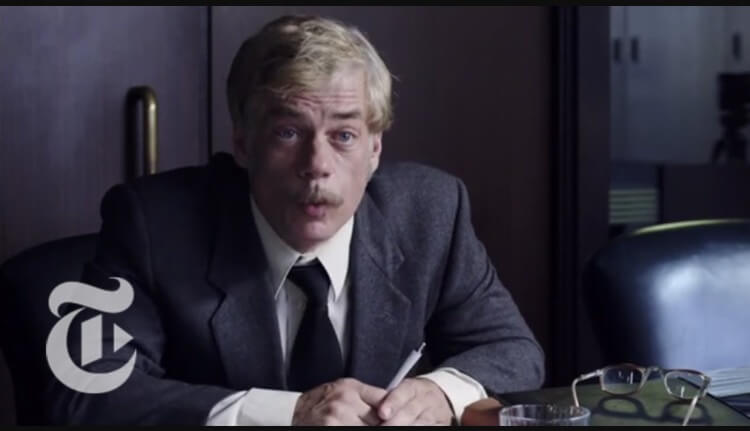
John Ennis plays a frustrated BigLaw attorney in “Verbatim.” Photo courtesy of New York Times.
Summary: Filmmaker Brett Weiner created a video series that captured the oddness of the legal world by using transcripts of real life cases as scripts.
In August of 2014, filmmaker Brett Weiner showed the world the absurdity of the legal world when his short video, “Verbatim,” was released through the New York Times. Weiner took a transcript from an Ohio case, and using the transcript word for word as a script, he showed audiences what it’s like for a BigLaw lawyer to interview a difficult dummy. The video, which was also shown at the Sundance Film Festival, went viral on the New York Times’ website, getting almost 1.5 million views.
“The dialogue was so sharp, inane and fully realized that I assumed it was fiction,” Weiner said. “I traced the deposition back to the Ohio Supreme Court and downloaded hundreds of pages of legal documents from the case. To my pleasant surprise, it was as strange as it was true.”
In 2015, Weiner continued his trend of making compelling art out of lawyer reality by releasing two other New York Times shorts in the Verbatim series: “The Ferguson Case” and “Follow the Chickens.” While these videos didn’t rack as many views as the original, they were just as interesting and well-researched.
Post-Verbatim, Weiner continues making comedic videos. He is currently a member of the filmmaking group, Screen Junkies, which produces the wildly popular “Honest Trailers” Youtube series.
VERBATIM (2014)
“Verbatim” was released in 2014, and it was a hilarious reenactment of a real deposition between lawyer Dave Marburger (played by John Ennis) of Baker Hostetler and a dim-witted government employee. The case itself was about Ohio’s Cuyahoga County Recorder’s Office’s decision to charge patrons $2/a page to make hard copies. A plaintiff filed a lawsuit against the office, ruling that the amount was unlawful. Marburger was tasked to ask a government employee about his use of a copy machine, and the deponent’s unawareness of what a photocopier was nearly drove the BigLaw attorney to the brink of madness.
THE FERGUSON CASE, VERBATIM (2015)
In 2015, Weiner followed up his viral comedic hit with a video of the same premise but different tone. In “The Ferguson Case,” Weiner juxtaposed two witness accounts in the case against Darrel Wilson, the police officer accused of killing unarmed black teenager, Michael Brown. Wilson shot Brown in a suburb of St. Louis called Ferguson, Missouri; and the murder sparked a national conversation about police brutality against unarmed black citizens. Weiner said that he did not seek to amuse like he did in his first video, but instead to educate. After reading thousands of documents released by the St. Louis County prosecutors, he realized that the explosive case was a lot more complicated than the media made it out to be.
“My intent is to add to viewers’ understanding of the story in as balanced a way as possible, remaining truthful to the facts, context and chronology of the testimony,” Weiner wrote in The New York Times. “I hope that when you watch this film, you can put yourself in the position of that grand jury, seeing and interpreting the testimony as they did.”
VERBATIM: FOLLOW THE CHICKENS (2015)
Weiner’s third “Verbatim” short film centered around a $300,000 case where a man sued a lumber company for damaging his chicken coupe. In this bizarre deposition, the plaintiff shares his crazy tale about the destruction of his land, and he answers simple questions with long-winded answers that even the court reporter had a hard time documenting.
- Related: Top 7 tips for Taking for Taking Your Own Deposition
- Related: Attorney Flips Out During Deposition
What do you think of these real life depositions? Let us know in the comments below!






































